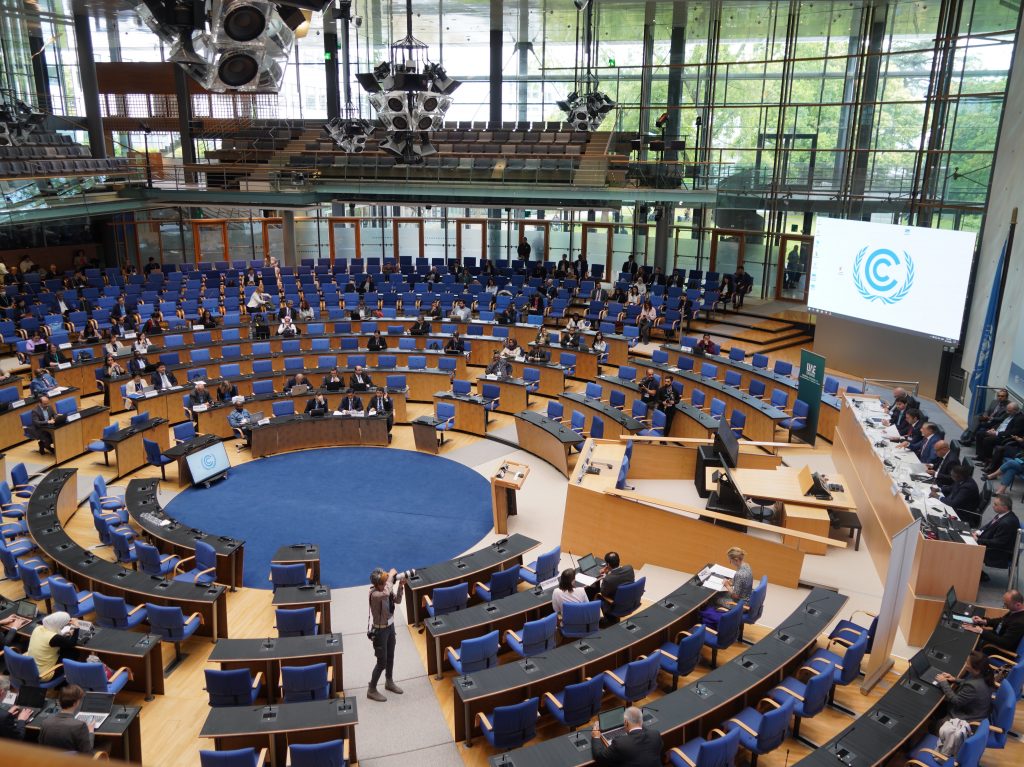
Source: UN Climate Change / Amira Grotendiek
In June 2024, Crude Accountability participated in a media training session for Russian-speaking journalists from Central Asia at the United Nations Framework Convention on Climate Change (UNFCCC) meetings in Bonn. Together with journalists from across Eurasia, Crude Accountability observed the UNFCCC, the Azerbaijani delegation, and civil society’s work during the short but productive three-day event.
By Yulia Genin, Crude Accountability Research Assistant
The UN is failing to uphold the UN Charter and meet climate goals. Instead of addressing issues like the unfair accreditation process for NGOs, it imposes stricter rules on public action during climate talks, negatively impacting civil society and discussions on climate. Azerbaijan is not showing leadership in the climate negotiation process and is intimidating civil society. Its lack of ambition and slow pace hinder progress toward capping rising temperatures to 1.5 degrees Celsius.
The UN shrinks civic space
Since COP24 in Poland, inclusive and effective participation has been of great international concern. During the climate talks, the UN slipped into a pothole of tightening the rules on public acts. “No activity derisory to the UN, any of their Member States, organizations or any individual or criticism that would go against basic rules of decorum is allowed,” – state the UN guidelines. In practice, no country, entity, or organization can be named during a public act, not even the country of origin of the person speaking up. This restrictive approach undermines the true essence of public expression, allowing only nominal freedom.
Nonetheless, members of a group of civil society organizations (CSOs) carried out public action to convey a fundamental message: “There is no climate justice without human rights.”
Unfair accreditation process
It takes up to two years to become accredited to the UNFCCC Convention of the Parties. COP29 in Baku, Azerbaijan, was announced in December 2023, leaving CSOs from Central Asian and Caucasian countries only a slim chance to express their concerns as an accredited CSOat the Climate Summit for their region.
At the same time, the UNFCCC allows a record number of fossil fuel lobbyists to access the summit through this unfair accreditation process. As the Secretariat staff told us, the lobbyists often join the party delegation as “experts” without other requirements or screening by the Secretariat. The country can bring as many “experts” as it wishes.
We asked the UNFCCC Secretariat if any reform of this unjust process is underway. In response, the Secretariat speaker discussed the importance of non-governmental participants during the negotiation process and suggested contacting the COP presidency or an accredited NGO to ask to be included. These solutions are not long-term or even short-term: a country like Azerbaijan is unlikely to allow any dissenting organizations to be included.
Criticism of the COP29 country’s human rights record leads to expulsion from the training
During the media training, one of the participants asked the Secretariat how Armenian NGOs could participate at COP29 if there was a travel ban for Armenian nationals.
The official Azerbaijani delegation participating in the training, who represent the presidency of COP29 Baku, yelled at the participant, accusing him of provocation and lying. The UNFCCC Secretariat subsequently expelled the participant from the media training.
The situation is unsettling. Will COP29 participants be able to freely and openly communicate without fear of reprisal? Why does UNFCCC “sanitize” and censor the environment at the meetings when there is no violation of the UN Code of Conduct?
Unfit to lead climate negotiations
During the discussion on the role of Troika (a union of United Arab Emirates, Azerbaijan, and Brazil COP Presidencies), Rovshan Mirzayev, the Azerbaijani lead on Troika relationships, did not answer a question about the COP29 presidency’s plans to keep the cap on rising temperatures at 1.5 degrees Celsius a viable goal. He had a generic response read from his phone and never mentioned transitioning away (not to mention phasing out) fossil fuel production. He noted that the COP29 presidency will engage with the parties about their Nationally Determined Contributions (NDCs), or climate action plan, in September. Adler Meyer, senior associate at E3G, an independent climate change think tank, noted during the panel discussion that to ensure a successful COP, the host country must begin negotiations with each individual country’s NDCs as soon as the decision on the host country is made, and not simply at the COP meeting.
E3G also remarked that the Azerbaijani delegation did not promote progress in the Bonn negotiations, kept a low profile, and shared little information about its plans to achieve the ambitious goals necessary to save the global climate at COP29. This manifested at the final plenary session, where numerous governments’ speeches were permeated with frustration about the stalling and regressing negotiation process.
Time is running out for everyone, including those who profit from the causes of climate change. Petro-states are affected by climate change no matter how strongly they defend their right to invest in and produce the“gift [fossil fuels] from god.”Climate action must be undertaken now, while there are still ways to secure our livable future. At the Bonn meetings, slow progress co-existed with civil society’s determination to make the planet safer for all. While the international willpower of the UNFCCC parties is critical, civil society is preparing for COP29 with all its might.
